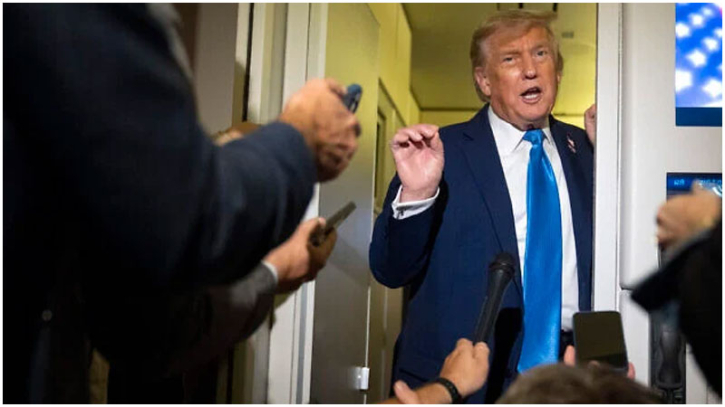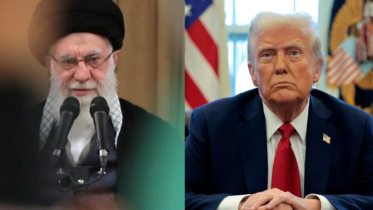Trump demands Iran's ‘unconditional surrender'

US President Donald Trump declared Tuesday that he is seeking Iran’s “UNCONDITIONAL SURRENDER” and that Washington is only holding off on assassinating Islamic Republic Supreme Leader Ali Khamenei “for now.”
Trump’s comments, delivered via social media, suggested a more aggressive stance toward Iran, as he weighs whether to deepen US involvement in the conflict.
“We know exactly where the so-called ‘Supreme Leader’ is hiding. He is an easy target, but is safe there — We are not going to take him out (kill!), at least not for now,” Trump wrote on Truth Social.
“But we don’t want missiles shot at civilians, or American soldiers. Our patience is wearing thin,” he added.
Trump, in the opening days of the conflict, rejected a plan presented by Israel to kill Khamenei, according to a US official familiar with the matter.
In a subsequent two-word post minutes later, Trump wrote, “UNCONDITIONAL SURRENDER.”
Earlier Tuesday, Trump claimed, “We now have complete and total control of the skies over Iran,” apparently referencing the US-made equipment used by Israel.
“Iran had good sky trackers and other defensive equipment, and plenty of it, but it doesn’t compare to American-made, conceived and manufactured ‘stuff.’ Nobody does it better than the good ol’ USA,” he wrote.
Hours earlier, Trump told reporters that the US is “not looking for a ceasefire,” but rather a “real end” to the conflict over Iran’s nuclear program, and that, after two months of talks in which Iran refused to dismantle its program, he is “not in the mood to negotiate.”
“We’re looking for better than a ceasefire,” he told reporters on Air Force One during his overnight flight back to Washington. Asked what would entail, he said, “An end. A real end. Not a ceasefire. An end… Or giving up entirely. That’s okay too.”
“Iran cannot have a nuclear weapon, it’s very simple,” Trump said.
“They should have done the deal. I told them, do the deal,” he said. “So I don’t know. I’m not too much in the mood to negotiate.”
The remarks from Trump, who huddled with advisers in the Situation Room later Tuesday, came as the US has repositioned warships and military aircraft in the region to respond if the conflict between Israel and Iran further escalates.
US Defense Secretary Pete Hegseth, however, said Trump’s position has not changed, and the forces in the Mideast and Europe are defensive.
Meanwhile, US Vice President JD Vance sought to address concerns among isolationists within the Republican Party who have expressed criticism over potential American involvement in the war, given that Trump had campaigned against the idea.
Vance on X argued that Trump has given diplomacy a chance, saying that Trump had directed his team to secure a deal that would prevent Iran from obtaining a nuclear weapon and from enriching uranium altogether.
“I’ve seen a lot of confusion over the issue of ‘civilian nuclear power’ and ‘uranium enrichment.’ These are distinct issues. Iran could have civilian nuclear power without enrichment, but Iran rejected that. Meanwhile, they’ve enriched uranium far above the level necessary for any civilian purpose. They’ve been found in violation of their non-proliferation obligations by the International Atomic Energy Agency (IAEA), which is hardly a right-wing organization,” Vance wrote.
“It’s one thing to want civilian nuclear energy. It’s another thing to demand sophisticated enrichment capacity. And it’s still another to cling to enrichment while simultaneously violating basic non-proliferation obligations and enriching right to the point of weapons-grade uranium,” he continued.
Trump “may decide he needs to take further action to end Iranian enrichment” and “people are right to be worried about foreign entanglement after the last 25 years of idiotic foreign policy.”
Nonetheless, Vance said he trusts Trump and is confident that the US president “is only interested in using the American military to accomplish the American people’s goals.”
Trump arrived at the White House early Tuesday at a decisive moment in his presidency. Israel has done considerable damage to Iran and believes it can now deal a permanent blow to Tehran’s nuclear program, especially if it has US help.
But increased American involvement could drive Iran to target American forces in the region, and some influential parts of Trump’s base have been vocally opposed to his support for Israel’s strikes thus far.
The White House announced Monday, while Trump was at the Group of Seven summit in the Canadian Rockies, that the president would be cutting his trip short.
“Simply stated, IRAN CAN NOT HAVE A NUCLEAR WEAPON,” he wrote on social media. “I said it over and over again! Everyone should immediately evacuate Tehran!”
Asked about his evacuation comments aboard Air Force One, Trump told reporters that “I just want people to be safe.”
He also insisted French President Emmanuel Macron was wrong to say the US was working on a ceasefire.
“We’re looking at better than a ceasefire. We’re not looking for a ceasefire,” Trump said, adding that Macron is a “nice guy but he doesn’t get it right too often.”
Trump said he wasn’t ruling out a diplomatic option, and he could send Vance and special envoy Steve Witkoff to meet with the Iranians.
“It depends on what happens when I get back,” he said.
He also dismissed congressional testimony from US National Intelligence Director Tulsi Gabbard, who told lawmakers in March that US spy agencies did not believe Iran was building a nuclear weapon.
“I don’t care what she said,” Trump said. “I think they were very close to having it.”
Iran, which vows to destroy Israel, has always denied any ambition to develop nuclear weapons, but its enrichment levels are far beyond any civilian purpose and the IAEA says it has obstructed inspectors from visiting its nuclear sites.
Speculation mounts of coming US involvement
Since launching its attacks on Friday, Israel has targeted multiple Iranian nuclear program sites but has not been able to destroy Iran’s Fordo uranium enrichment facility.
The site is buried deep underground, and to eliminate it, Israel may need the 30,000-pound GBU-57 Massive Ordnance Penetrator, which uses its weight and sheer kinetic force to reach deeply buried targets and then explode. But Israel does not have the munitions or the bomber needed to deliver it — the penetrator is currently delivered by the B-2 stealth bomber.
Israel’s own defenses remain largely intact in the face of Iran’s retaliatory strikes, but some of Tehran’s missiles are getting through and having a deadly impact.
The White House, soon after announcing Trump was returning to Washington, dispatched Hegseth for a prime-time Fox American appearance as speculation grows about whether Trump could be tilting toward more direct US involvement.
Hegseth told Fox News’ Jesse Watters that “of course” Trump wanted to see a deal made to curb Iran’s nuclear program.
“His position has not changed,” he said. “What you’re watching in real time is peace through strength and America first. Our job is to be strong. We are postured defensively in the region to be strong in pursuit of a peace deal. And we certainly hope that’s what happens here.”
In an interview with The Atlantic on June 14, Trump specified: “Well, considering that I’m the one that developed ‘America First,’ and considering that the term wasn’t used until I came along, I think I’m the one that decides that. For those people who say they want peace — you can’t have peace if Iran has a nuclear weapon. So for all of those wonderful people who don’t want to do anything about Iran having a nuclear weapon — that’s not peace.”
.png)




